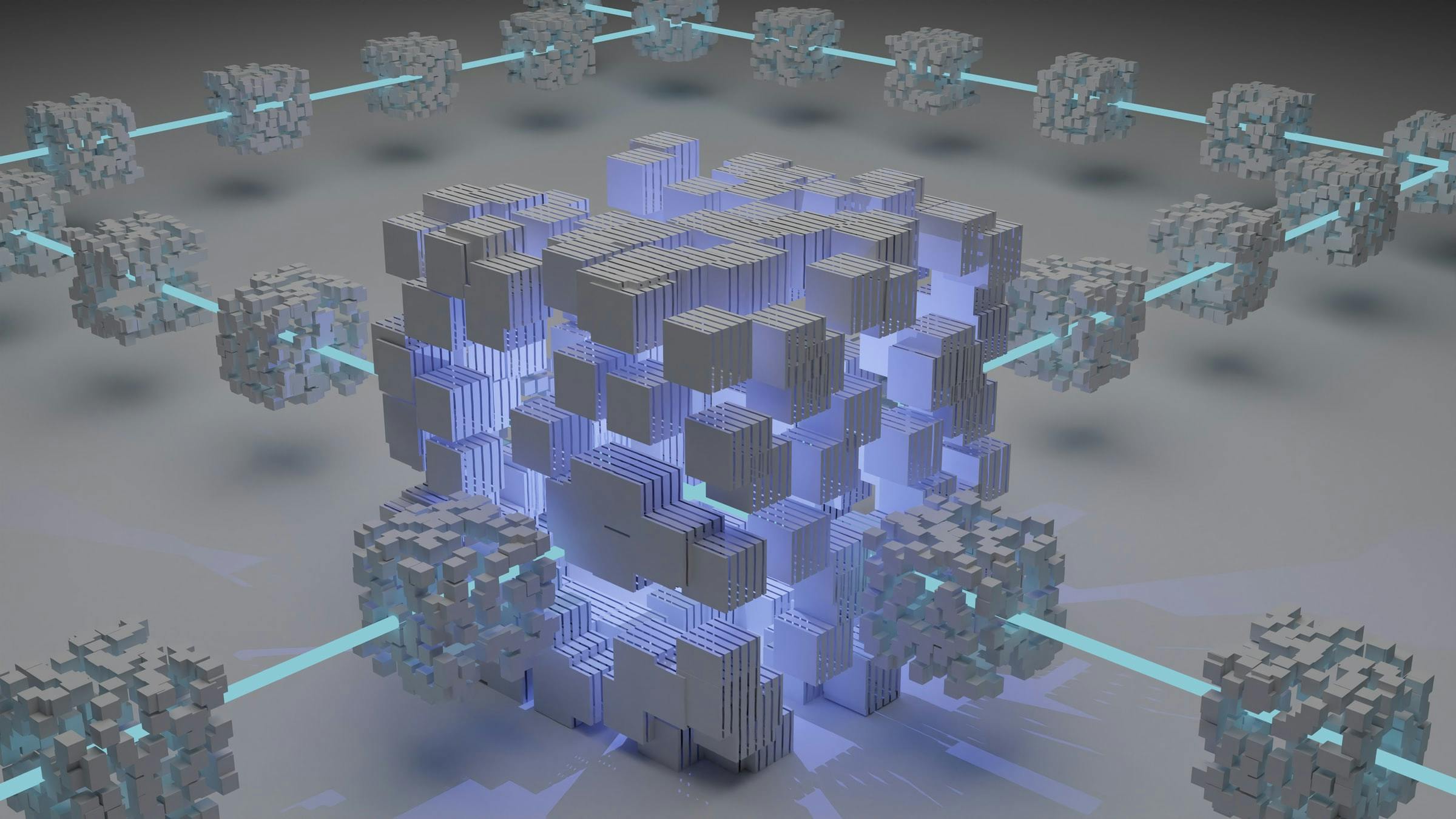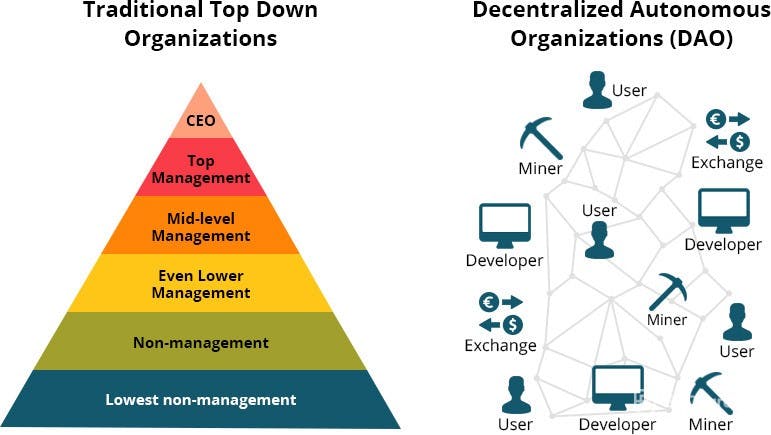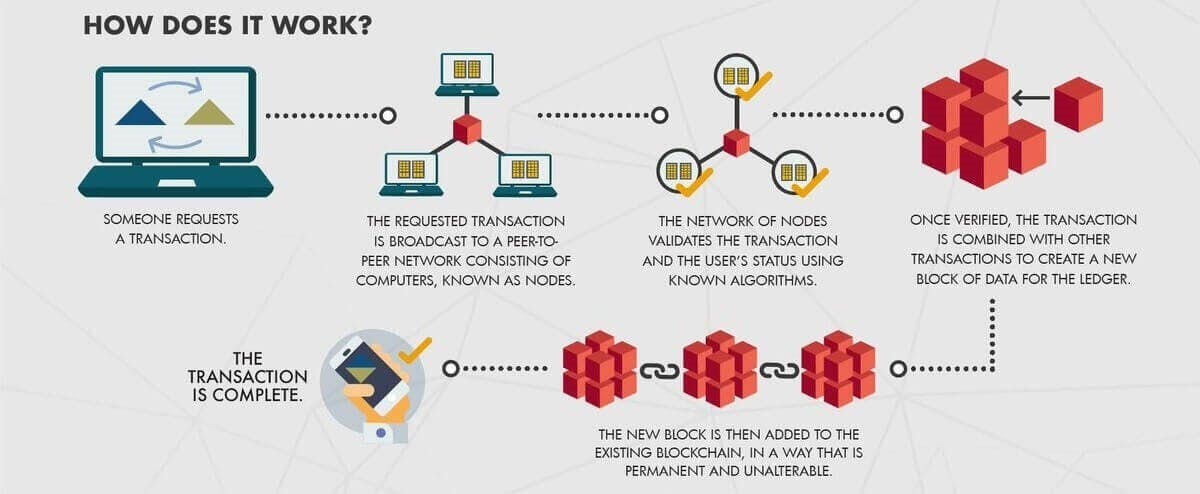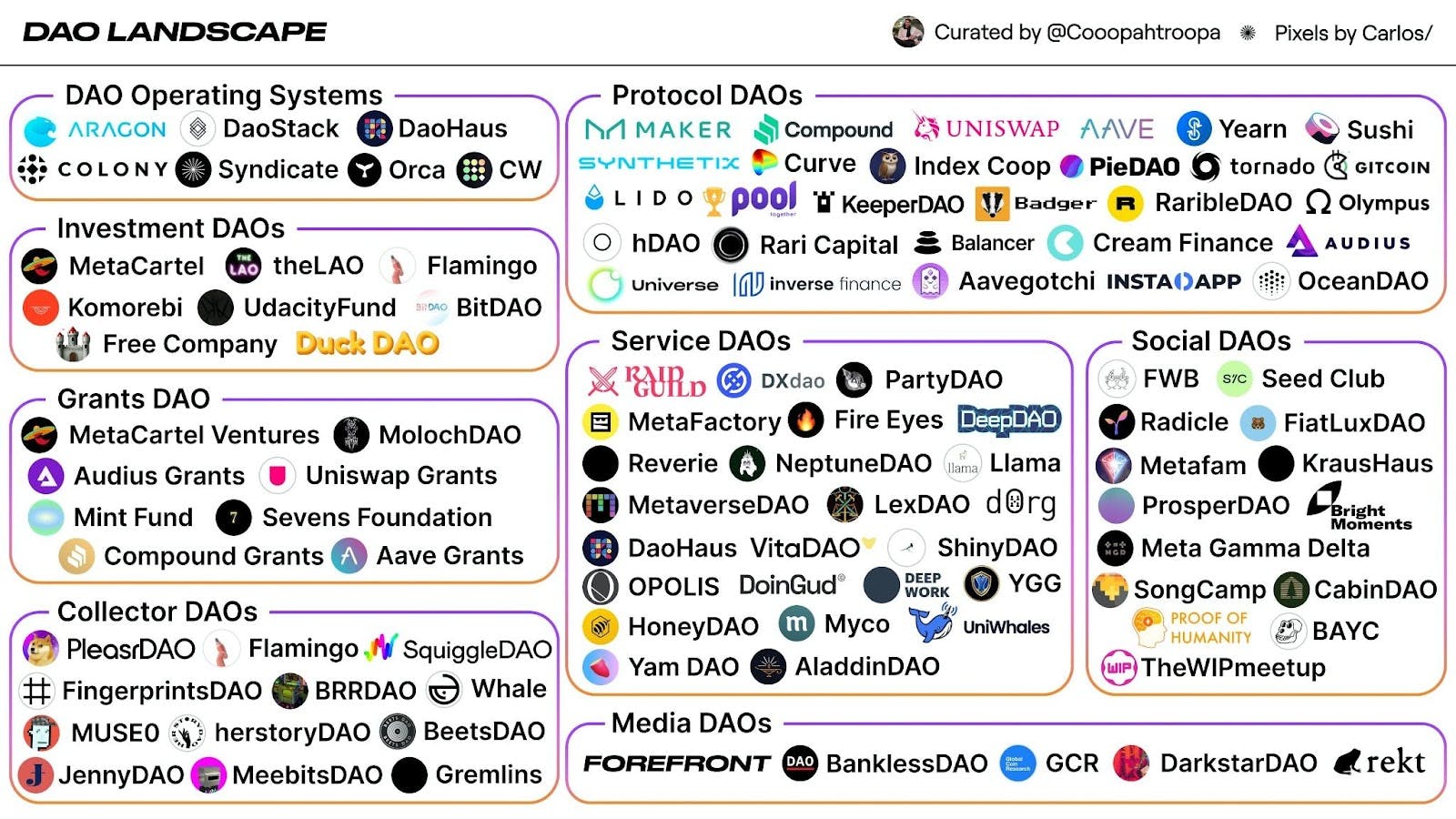Are DAOs the Next Iteration of Human Organization or Just Another Sure Thing to Fail?
Table of contents
No headings in the article.
 Source: Unspash, Shubham Dhage.
Source: Unspash, Shubham Dhage.
If you have been an active player in the Web3 field, you’d have heard of DAOs. Unless you live under a metaphorical Web3 rock. You may even be a part of one or two DAOs, but you have no idea how they work. This piece will give you a clear picture of what DAOs are, why they are important and how they are run.
Another cryptocurrency swindle?
I know some DAOs might have turned out to be huge scams, but what good cause isn’t plagued by bad actors one way or another? Decentralized Autonomous Organizations, aka DAOs, are becoming increasingly popular, particularly among web3 users. Decentralized here implies flat, autonomous means self-governing, and organization is a group of humans working toward a common purpose.
As Ethereum says, DAOs are “member-owned communities without centralized leadership." A safe way to collaborate with internet strangers... to commit funds to a specific cause. ”
If you love the whole concept of democracy you’d love this. To paraphrase one of Abraham Lincoln's statements, a DAO is an organization run by, for, and by the people. I know it sounds corny, but the values adopted by DAOs are just that.
Since DAOs are flat and decentralized, how on earth do they ever decide and get anything done?
I want you to take a moment to picture this; an organization where a CEO does not have veto power on every decisions or where the board of directors cannot dictate the direction a company goes. No corporate secrecy because every decision is scrutinized by the community. And the chances any organisation you have a stake in commit any form corporate fraud is nil because no one person or group has any undue advantage.
Governance
 Source: Moralis Academy
Source: Moralis Academy
Every DAO has its own native decentralized governance model. Most traditional organizations (P.S. I use the word traditional here to mean the status quo) get their legitimacy from a government agency. A DAO is developed on blockchain technology and because a blockchain is immutable it can be trusted. The only legitimacy it needs is widespread adoption and a strong community behind it. Its entire operations can be run from a computer with an internet connection.
A DAO has little or no need for governmental approval. A DAO's money is global, open-source, and not under the jurisdiction of any government. DAOs, though unregulated, are not lawless. Like any human organization, DAOs set their own rules on purpose, membership, voting, etc. Most DAOs have some sort of constitution detailing their values, protocols, rules, etc. There are even Web3 dispute resolution services (Aragon Court). It's an entire ecosystem!
In a DAO, there is no hierarchy. A traditional organization has a sort of pyramid structure. Translation; power flows from top to the bottom. A DAO could not be more opposite. A DAO's structure is flat. Every decision must be community-backed. A company ultimately takes on the identity of its founders. A DAO's only identity is the one given to it by the community.
By allowing anyone to propose an idea and everyone to vote on it, DAOs encourage contributions for improvements. This technique utilizes all available talent within the organization paving the way for much growth. I can argue that DAOs are a more economically efficient organization than traditional companies. Companies and governments have been accused of being "wasteful hierarchies" because they hold much power and make decisions without proper consultations of the people or employees. They commit resources to projects without obtaining consensus from stakeholders. When these projects fail, it has more lasting effects on the people than the companies or governments. DAOs can out-perform wasteful hierarchies by making community backed decisions.
See something you don’t like in a DAO? You can make a proposal which is then voted on by the entire community. Like a democracy, a DAO thrives on the majority-rule. Any member can propose an idea, and every member can vote democratically on a decision. DAOs eliminate the layers of bureaucracy and middle-management present in any traditional organization that makes it really frustrating to implement actual positive changes.
Technology
 (Source: The Burnie Group)
(Source: The Burnie Group)
You can access a DAO software using a web browser and its [backend (airfocus.com/glossary/what-is-a-back-end) infrastructure is usually hosted on blockchain based networks such as Ethereum. Blockchains are run on nodes worldwide that check each others' integrity making it really hard for bad actors to take over the network. Attempt to make a fake payment? Ethereum says it will be rejected by all the others. Even if an entire continent were to ban Ethereum, the network itself might just go underground (kind of like the Tor network). DAOs are the most strong and censorship-resistant organizations yet devised because of this.
Smart contracts are the literal backbone of a DAO. The contract establishes the organization's policies and safeguards the group's funds. No one can change the rules after the contract is live on the blockchain except by a vote. The moment a DAO's code is deployed on the blockchain, its creators have no more influence than other stakeholders. If a person attempts to do something that isn't covered by the code's rules and logic, it's sure to fail.
A DAO's treasury is also included in the smart contract, which implies that no one can spend the money without the group's authorization. Once smart contracts live on a blockchain, they are tamper-proof. Because of an immutable timestamp and the distribution of information to the network's participants, you can't unilaterally change the code without people noticing.
For any changes to be made, a proposal has to be put forth to the community for consideration and must be approved by the community. It usually involves writing new code. When a proposal is to be voted on, the smart contract will automatically tally votes and execute the decision without relying on a human intermediary!
Secuirity is an important part of a DAO. It is important that the developers are able to react quickly to any error in the deployed code. Any vulnerability leaves the DAO susceptible to hacker attacks that could exploit security flaws and drain the treasury. We’ve seen this happen with The DAO Hack in 2016.
Economics
DAOs use something called token economics. DAOs are funded by the community. Funds are collectively owned and managed by the community. The funds in the treasury are only accessible with the approval of community members. A DAO’s protocol typically involves issuing governance tokens via airdrop for early investors or selling tokens for late investors. Tokens have a wide range of utilities. It could represent voting rights, memberships or the holder’s stake in a DAO.
To be part of a DAO, you can purchase tokens or NFTs that are locked within a smart contract during the fundraising stage. Owning these tokens gives you voting rights on key decisions. The amount of token you hold determines the weight of the vote. Users with the highest amount of tokens have more voting power. This is one weakness of a DAO that can be exploited. Definitely some improvement to be made on that one. Some DAOs reward voters with additional cryptocurrency as a system to encourage further participation.
The DAO is considered functional at the end of the financing period. Any subsequent key decisions surrounding the organization are made by users upon reaching a consensus on proposals. DAO membership may be exchanged i.e. sold.
I heard about what happened to The DAO in 2016. Wasn’t it an epic fail?
The DAO concept was first proposed by Dan Larimer with BitShares(originally called a decentralized autonomous company (DAC)). Ethereum built upon the concept.
To clear up any misunderstandings about whether a DAO and The DAO of 2016 are the same thing, I'll say the latter is an example of a typical DAO. It might have been an epic fail but it laid the foundation for what DAOs are today.
The first DAO created on the Ethereum blockchain, named The DAOfailed because hackers found a loophole in the code. But what innovation is ever perfect at the first try? I mean just look at the guy that created the light bulbs. A thousand failed attempts? I’d say he has some guts to try and fail so many times. Even more so for DAOs which might just be the next iteration of human organizations. DAOs, if properly structured and governed, can create a sort of level playing ground so that everyone that contributes to it gets some sort of in return.
Use cases for a DAO?
 Source: Mirror, Coopahtroopa.
Source: Mirror, Coopahtroopa.
Well just off the top of my head, say you are passionate about a cause and you want to establish a platform where like-minded people can come together, contribute towards and fund the project, then a DAO is the way to go. Why? Because you don’t have to go through the hassle of all the bureaucracy involved in starting this type of project traditionally.
The underlying technology, blockchain, might be a bit complex to wrap your head around, but the benefits are too good to ignore. Remember how seemingly complex the internet was and now it’s like an extension of us!
Checkout MakerDAO, BanklessDAO, and MetaFactory which are fully operational DAOs with their own protocols. They each maintain a stablecoin, issue funds against crypto collateral and promote culture and fashion in the metaverse respectively. There are literally thousands of DAOs just as there are thousands of cryptocurrencies. DAOs are the organizational structure of web3 just as cryptocurrency is the cash. In the future with extensive research and development, even countries might be structured to look this way.
Are DAOs even legal?
DAOs, with the exception of Wyoming and the Marshall Islands, have no legally enforceable rights. Their smart contracts may carry out tasks, but those tasks are not legally recognized or enforceable. El Salvador became the first country to recognize bitcoin as legal money in late 2021.
Okay I’ve gone on and on about this DAO, why would you even consider a DAO over a traditional organizational structure. The status quo brings us order and a DAO sounds like a recipe for disaster.
We all like to assume our idea is the best. On the surface a DAO seems chaotic because of the lack of any central authority to organize and call the shots. Just dig a little deeper and you’d find that a DAO has its own set of protocols. Every DAO has some sort of governance mechanism. The only difference is that they are open sourceand anyone can suggest improvements.
You could say one distinguishing difference between a DAO and a traditional organization is that a DAO advocates for the community i.e the people instead of the traditional bottom line i.e. profit. Because a DAO upholds the well-being of its members at its core, their activities will not be detrimental to the planet said people live.
This is why I am enthusiastic about the game changer a DAO is. DAOs have been around for barely 10 years, and they have been operating in an industry with no regulation during this time, but somehow, they've proven that with the right ethical framework, diligence, and community, a company can create real, lasting environmental and social benefit, while also making a lot of profit.
Researchers discovered evidence that when people believe their leaders are untrustworthy, they employ the use of some sort of artificial liaison, in this case, blockchain, which they consider to be more trustworthy because they lack human emotions.
Criticisms?
After writing this piece in support of DAOs and what I believe they can offer in times to come, it's the people who actually follow the true tenets of what a DAO should be that can prove how successful a DAO can be and the advantage of implementing a DAO over a traditional organization. For instance, DINO (Decentralized In Name Only), referring to all Crypto projects where a one person or a group dictates most of development, monetary policy, node operations and mining constitute a menace for true DAOs.
Just look at the Terra Ecosystemwhich claimed to be decentralized and coin holders had voting rights. In reality the central figure at Terra, De Kwon was a dictator who made the final decisions and influenced the direction the organization took. This is in bad taste for the novel idea that is a decentralized ecosystem.
Now to answer the big question: what is the future of DAOs?
Still not convinced about the potential of DAOs? Well I've already droned on and on. To try to convince you of the opportunities DAOs. DAOs provide a platform where neither internal nor external actors can harm the system.
DeepDAO, a DAO analytics engine, says the whole DAO ecosystem consists of 4,000 organizations managed by 1.8 million members with a $7.7 billion treasury. This statistics means people are putting their money and by extension, trust in DAOs. The continued funding of DAOs and its widespread adoption I can only assume that this trust is well placed.